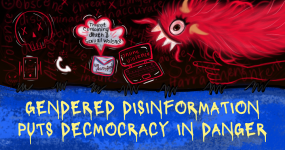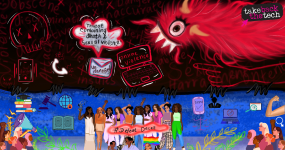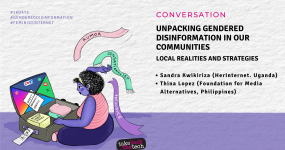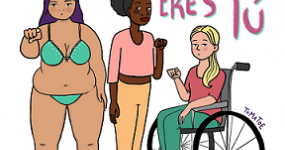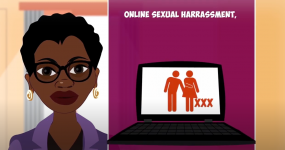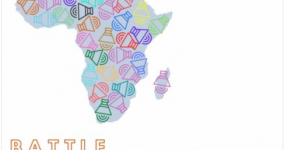Gendered disinformation falls under online gender-based violence (OGBV), and uses false and misleading narratives (with malign intent) against women and queer persons that use their gender as the focus of attacks. Shaming, intimidation and using threats of violence are three common strategies within it, and they often overlap with each other.[1]Here’s what gendered disinformation is: A strategy…
Online gender-based violence (OGBV) is now a widely accepted term used to name the behaviours that harass and target women and gender-marginalised people on the internet. A much lesser known term — a subset of OGBV — is gendered disinformation, an evergrowing concern today.So what is gendered disinformation?Gendered disinformation is a strategy to silence women and queer folks that “uses false or…
In December 2023, we spoke to activists in Brazil, Guatemala, Bolivia, Uganda, and Kenya about gender-targeted disinformation. In these conversations, the main goal was listening to lived experiences and possible practices to fight against mis and disinformation. Women human rights defenders (WHRD) Andrea Ixchiu, Lori Regattieri, Raisa Valda, Sandra Kwikiriza and Thina Lopez participated in the…
Image via The Self-Training Guide: How can we carry-out cyberfeminst workshops?Recently, I published, in Hiperderecho, The Self-Training Guide: How can we carry-out cyberfeminst workshops? This material is the result of the efforts, the learning and the sistematization of many Latin-American experiences. It includes the issues of care and digital security in the discussions for women and…
In the context of creating feminist infrastructures, a call from the feminist collective Numun Fund sparked the creation of a workshop “Talking heads: creative translation of images for a feminist internet”, a space guided by feminist exploration that sought to make the internet more inclusive and focuses on the needs of people living with vision disabilities. In this article, we summarise…
This piece is a part of a series of blogs to share experiences of various projects that came out of the All Women Count-Take Back the Tech! (AWC–TBTT) grants. This project was born out of the grant awarded to WOUGNET in 2020.
This piece is a part of a series of blogs to share experiences of various projects that came out of the All Women Count-Take Back the Tech! (AWC–TBTT) grants. Love, Sex and Tech was one such project born out of the grant awarded to Indu Harikumar in 2020.
Fighting patriarchy and ableism through pleasure work. Defining what pleasure is. Compiling Online Gender Based Violence (OGBV) research. Being kinky, queer and vulnerable online. Interviewing sex workers, coaches writers, researchers and artists. Embracing queer identity in the face of online violence. Understanding the experiences of African women who had faced various consequences due to OGBV…
Twenty projects from Africa and Asia and the diaspora received small grants in 2020 from the All Women Count - Take Back the Tech! initiative.All Women Count-Take Back the Tech! is a four-year project from 2017 to 2020 being coordinated by APC’s Women's Rights Programme (WRP) under the All Women Count consortium. The consortium’s concern is violence against women, in particular violence…
Image via Sound The Call: Battle Cry Sound the call and this time, it’s a Battle Cry! In this voice note series, we share stories of gender-based resistance throughout the continent. In this ten-episode series, our voices will highlight stories of pain, healing, injustice, and our determination to change a system created to oppress us based on our gender and sexual identity.This is the…

